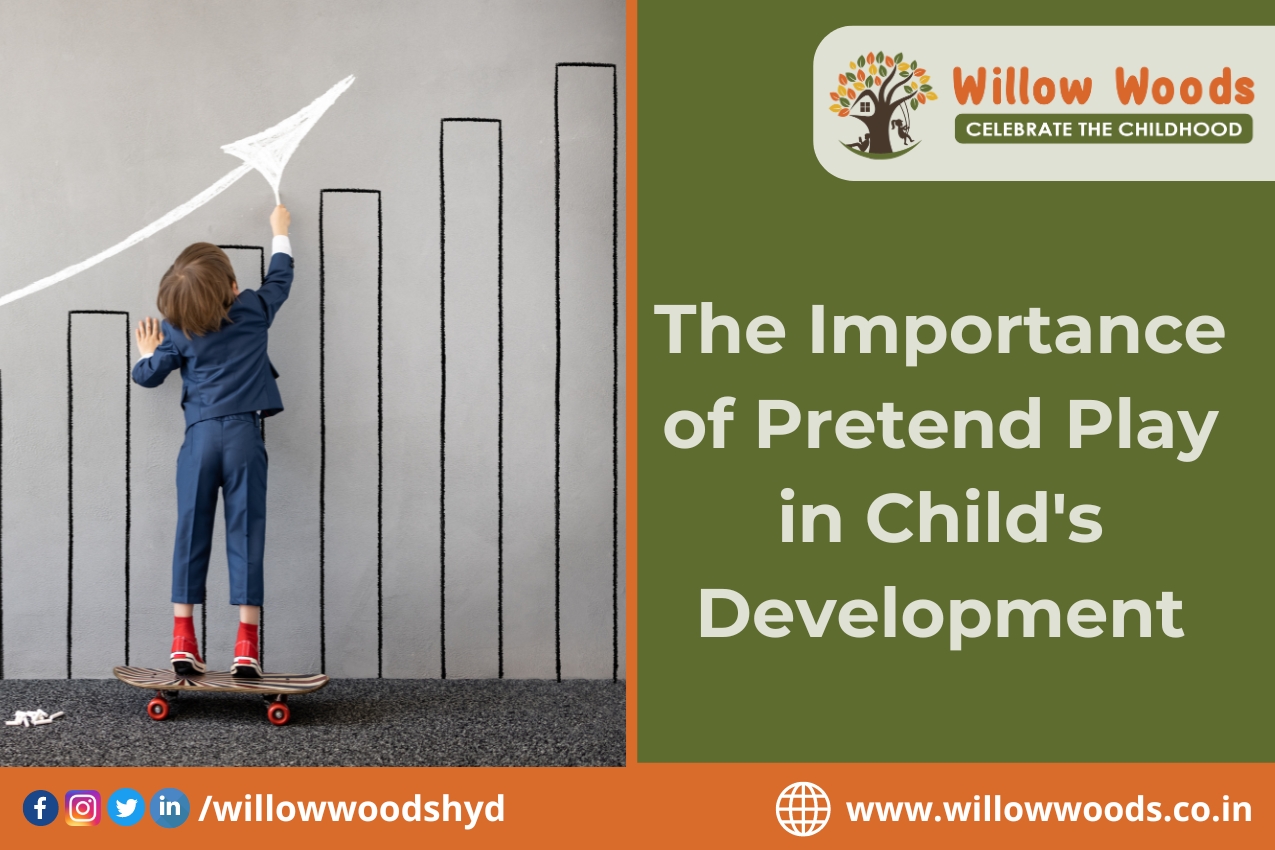Have you ever watched children on a playground? One moment they’re best friends, the next they’re arguing over a toy. Then suddenly, they’re laughing together again like nothing happened. That little roller coaster is social development in action. During the preschool years, children begin learning how to share, cooperate, listen, and express themselves. These abilities
Introduction
Pretend play is more than just a fun activity for children—it’s a cornerstone of their development. At Willow Woods Pre School in Mayuri Nagar, we understand how pivotal pretend play can be in nurturing young minds.
What is Pretend Play?
Pretend play, also known as imaginative play or role play, involves children creating and acting out scenarios that reflect real-life situations or fantasies. From playing house to imagining adventures as superheroes, pretend play allows children to explore the world around them in a safe and imaginative way.
Benefits of Pretend Play
Cognitive Development
Engaging in pretend play stimulates various cognitive processes such as problem-solving, decision-making, and critical thinking. Children learn to navigate complex situations and explore different perspectives.
Social and Emotional Skills
Through role-playing, children develop essential social skills such as empathy, cooperation, and conflict resolution. They learn to understand others’ emotions and communicate effectively.
Language and Communication Skills
Pretend play encourages language development as children use words to express their thoughts, negotiate roles, and interact with peers. It enhances vocabulary, sentence structure, and storytelling abilities.
Problem-Solving Abilities
In imaginary play scenarios, children encounter challenges that require creative solutions. They learn to think on their feet, adapt to changing circumstances, and devise strategies to achieve their goals.
Creativity and Imagination
Pretend play nurtures creativity by allowing children to explore limitless possibilities. They invent characters, settings, and plots, fostering imaginative thinking and originality.
Role of Adults in Facilitating Pretend Play
Parents and educators play a crucial role in supporting and enriching pretend play experiences. By providing props, participating in play scenarios, and encouraging creativity, adults create a nurturing environment where children feel empowered to explore their imaginations.
Examples of Pretend Play Scenarios
Pretend Restaurant: Children take on roles as chefs, waiters, and customers, practicing manners and learning about food preparation.
Superhero Adventures: Imagining superpowers and heroic deeds, children explore themes of bravery, justice, and teamwork.
Doctor and Patient: Role-playing medical scenarios helps children understand empathy, caregiving, and the human body.
Pretend Play and Academic Readiness
Research indicates that children who engage in rich pretend play experiences during early childhood demonstrate enhanced readiness for formal education. They develop pre-literacy skills, numeracy concepts, and the ability to focus and concentrate.
Integrating Pretend Play in Early Childhood Education
At Willow Woods Pre School, we integrate pretend play into our curriculum to enhance learning outcomes. By incorporating thematic play areas, storytelling sessions, and collaborative projects, we foster holistic development and prepare children for future academic success.
Conclusion
Pretend play is not merely a pastime for children; it is a powerful tool for learning and growth. At Willow Woods Pre School in Mayuri Nagar, we celebrate the transformative impact of pretend play on every child’s development journey. Embrace the magic of imagination and watch your child thrive.
FAQs
Why is pretend play important for my child’s development?
Pretend play enhances cognitive skills, social abilities, and creativity, laying a foundation for future learning.
How can parents encourage pretend play at home?
Provide open-ended toys, create a designated play area, and join in your child’s imaginative adventures.
At what age should children start engaging in pretend play?
Around 2-3 years old, children begin to show interest in imaginative play, which evolves as they grow.
Does pretend play have educational benefits?
Yes, it promotes language development, problem-solving skills, and emotional intelligence.
What role does pretend play play in building social skills?
Pretend play allows children to practice social interactions, empathy, and cooperation in a playful setting

